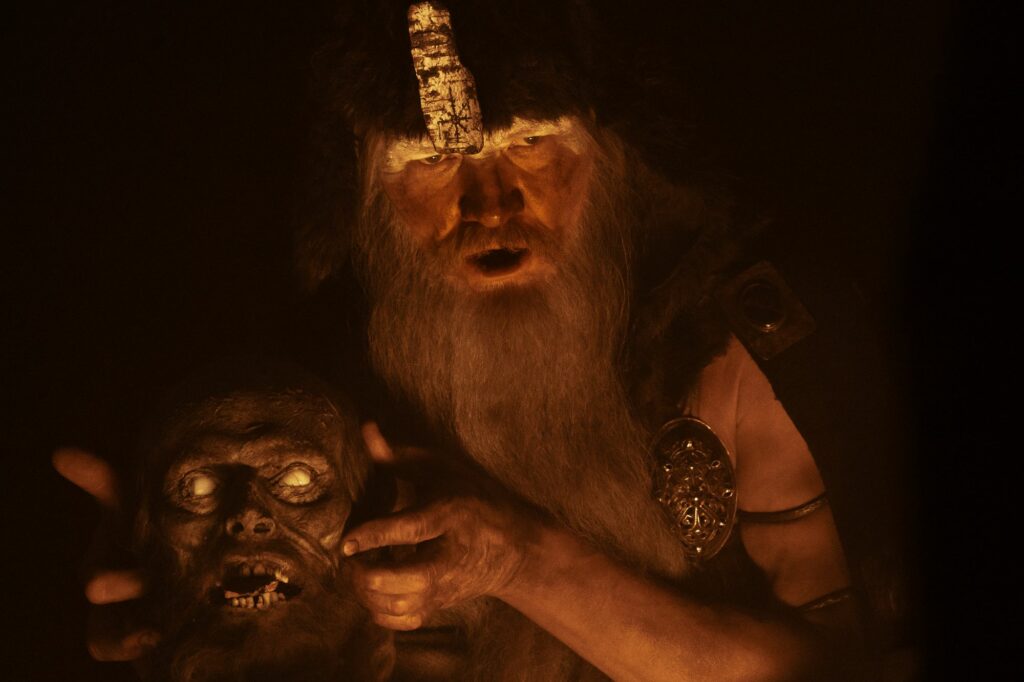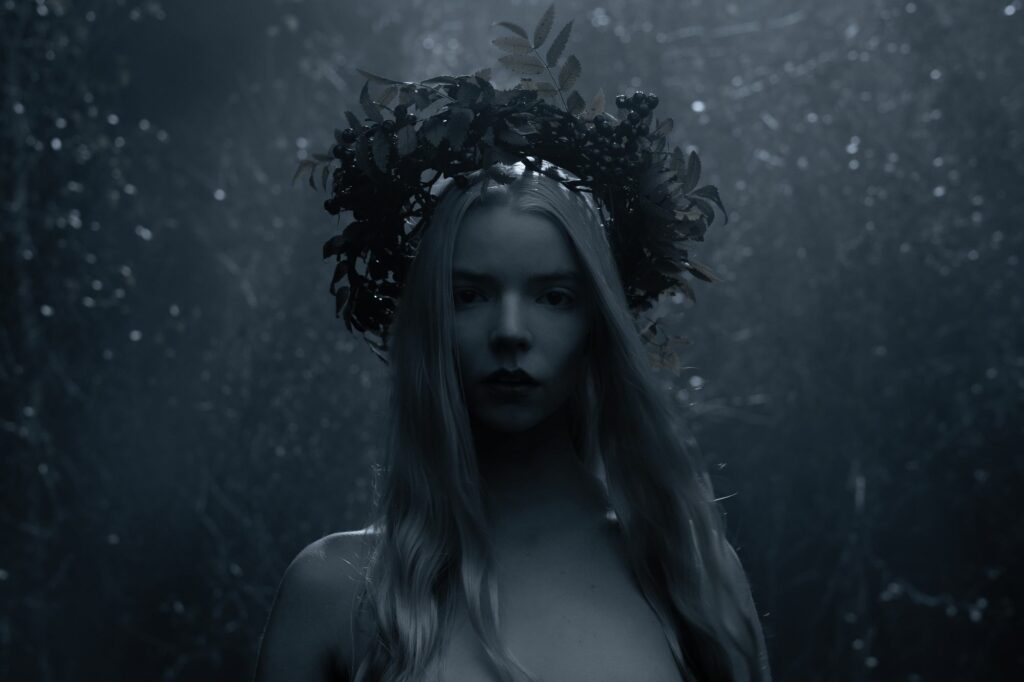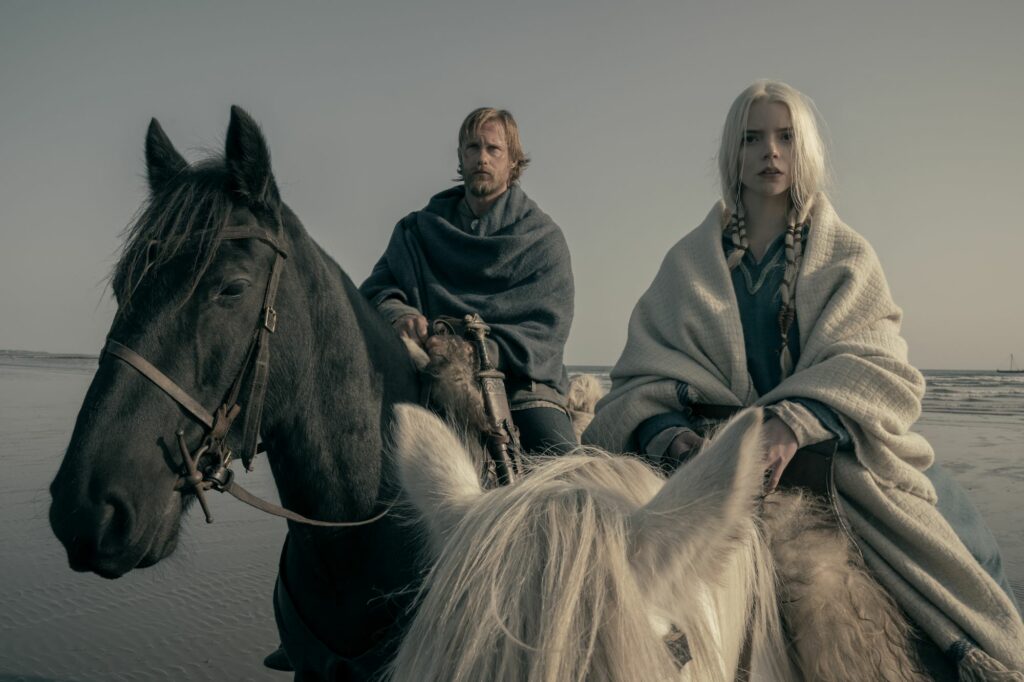No one is making films like Robert Eggers. On the one hand, the filmmaker’s works are devotedly period-accurate, making use of on-location shooting, meticulously constructed costumes and sets, and authentic accents and dialects that would send most financers running. On the other, Eggers’ commitment to historical realism also encompasses the folkloric, the fantastic, the otherworldly, flirting with genre tropes only to reject most of them in favour of something altogether more unusual.
Eggers’ first two features have been knockouts: The Witch was a deeply unsettling portrait of a 17th-century Puritan family collapsing, featuring cinema’s most memorable talking goat, while The Lighthouse was a bawdy chamber piece focused on a pair of lighthouse keepers as they descended (or rather, ascended) into madness. The Northman, the director’s first foray into blockbuster territory, retains Eggers’ signature style but blows it up to a scale previously unimaginable. This time, his sights are set on 10th-century Scandinavia, and more specifically the same Icelandic legend that inspired Hamlet — if you know your Shakespeare, you’ll have some idea of where this is headed.

The film begins with the return of King Aurvandill (Ethan Hawke) to his wife, Queen Gudrún (Nicole Kidman), and their young son Prince Amleth (Oscar Novak). Aurvandill has been at battle, and the wounds he has sustained – as well as the accompanying anxiety about the successor to his throne – have persuaded him that it’s time for his boy to become a man. At this early point in the film, anyone concerned that studio pressure might have tamed Eggers’ weird streak will find themselves relieved: Amleth is led by his father into a cavern, where Heimir the Fool (a dependably deranged Willem Dafoe) directs a ritual that involves belching, farting, dog roleplay and drug-fuelled visions of a literal family tree.
King Aurvandill, like all the Viking men we encounter in the film, is set on dying in battle. It’s no sooner that he reminds little Amleth to avenge him in such an eventuality that the king is brutally slain by his treacherous brother Fjölnir (Claes Bang, suitably dastardly), who takes Gudrún as his wife and orders her son killed. Amleth escapes by sea, screaming the mantra that sets the narrative in motion: “I will avenge you, Father! I will save you, Mother! I will kill you, Fjölnir!”

Flash forward twenty years or so and Amleth is a wild-eyed, bulked-up berserker (now played by Alexander Skarsgård) embarking on a brutal massacre on a village in the kingdom of Rus. It’s here he has a vision courtesy of a blind seeress (Björk!) which reminds him of his vow for vengeance. The timing couldn’t be better, as it’s also here he happens upon the information that a group of captives present are being sold to none other than Fjölnir, who has since absconded to Iceland. Disguising himself as one of the slaves, Amleth stows away to the north on another boat, on which he meets Olga (Anya Taylor-Joy), a young slave with some witchy abilities of her own.
Whereas last year’s The Green Knight viewed its mythic medieval setting through a modern, revisionist lens, Eggers is quite happy to simply inhabit the world of the Vikings as they would have – child murder, horse beheadings and all. Present taboos aren’t fussed over, and period-specific idiosyncrasies are part and parcel. At one point, Amleth finds himself star player in a sport that combines elements of rugby, lacrosse and a particularly violent bar brawl. Later, after defeating an undead warrior, Amleth chops off its head and triumphantly shoves it up its arse.
Though it’s worth asking whether the literal (if aestheticized) approach to the material – “what would a Viking do?” seems to be the guiding logic of any given scene – risks revelling a little too much in its characters’ violence, Eggers’ dedication to the bit can’t help but impress this critic’s inner historian. There aren’t the usual sentimental appeals to suggest that Amleth’s morality is in tune with our own, and if this makes it a little harder to root for our protagonist, well, that’s probably the point.
Though it’s not exactly typically Hollywood in character, the film is certainly more straightforward than Eggers’ previous films. The Northman is a much larger project, and the emotional dimensions have been amplified along with the scope of its setting. Seen on its own it all works, but it’s hard to shake the feeling that something’s been lost in the process. At points, one might find themselves craving the small-scale, claustrophobic drama and humour of Eggers’ previous films. The screenplay, co-written by Eggers and Icelandic poet Sjón, musters some decent lines, yet they have a tendency to get lost in the relentless spectacle; Taylor-Joy’s Olga suffers the most for this. (There’s a notable exception: Kidman is given the space for a juicy monologue, and it’s glorious.)

Still, while we might say The Northman is a slight step down for Eggers in dramatic terms, it can hardly be faulted for entertainment value. Credit has to go to the hulking Skarsgård – never more imposing – and to Eggers and his regular cinematographer Jarin Blaschke for the precise, often lengthy takes that put us right at the heart of the action. Though the text of the film might be more solemn than The Lighthouse, it’s still able to extract a kind of manic glee from its sheer aesthetic extravagance: the final battle, in which practically naked Vikings hack at each other atop an active volcano, is the kind of thrilling nonsense films like this need.
It’s interesting to note how few contenders there have been for a definitive Viking film – Richard Fleischer’s The Vikings (1958) and Nicolas Winding Refn’s Valhalla Rising (2009) are the slightly underwhelming candidates. With The Northman, there’s a willingness to go to weird places that similar films don’t usually dare, and to imbue those moments with an intensity they rarely reach. As such, it’s the definitive Viking film to date.
The Northman releases in cinemas April 15th.
